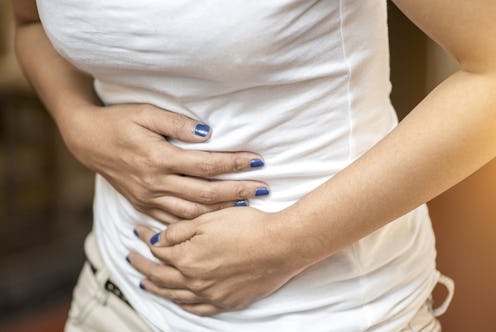Life
10 Super Common Things You Didn't Realize Can Cause Bloating
Being bloated is so uncomfortable. A whopping 74 percent of Americans have suffered from GI discomfort, which encompasses a range of symptoms including bloating. Although many people experience bloating in their lifetime, over half of them don't discuss it with their doctor — even though they might not be able to identify what's causing their bloating. Because bloating is so common, a lot of people don’t think it’s a serious problem to discuss with a medical professional, but that’s not always the case.
“Although a lot of people who suffer persistent bloating don’t usually take it seriously, it may actually be a symptom of a serious medical condition,” Clinton Bakasa, a dietician based in South Africa, tells Bustle. Bakasa also shares that certain foods can trigger bloating and because a lot of bloat-inducing foods have nutritional value, it’s best to “consult with a dietitian or nutritionist on other food replacement options.”
Listening to your body is key, and an important component of listening to your body is noticing patterns. Keeping note of how your body feels after eating certain foods or after different activities can reveal what may be causing you to feel bloated. Ahead, you’ll find common causes of bloating and how to deal with them — whether that's taking your symptoms to your doctor, or simply avoiding certain foods.
1Your Period
During your period, your hormone levels change and your body retains more water, which can lead to bloating. This may sound counter intuitive, but drinking more water while on your period will cut down on bloating.
2Carbonated Beverages
The tiny bubbles you see in your favorite soda aren’t just for decoration. When consumed, they can make your belly swell. Swap your La Croix for a non-carbonated drink instead.
3Food Allergies
The symptoms of food allergies aren’t always a rash or swollen eyes. Bloating can be a common symptom as well. If you body cannot digest certain foods, the intestines will have to work harder to get them through your system, and your stomach will swell as a result. If you notice bloating after eating items from a particular food group, consider asking your doctor for an allergy test.
4Constipation
If you just realized you haven't pooped in a few days, you may be bloated due to constipation. Exercising will get your intestines muscles moving, and they need to be active to have a bowel movement. You can also eat foods that contain more fiber and drink more water.
5Pregnancy
Bloating during early pregnancy is common. The body releases a hormone called progesterone that slows down digestion, making bloating an inevitability. Take a pregnancy test and consult a doctor to confirm if you’re pregnant.
6Sodium
Too much sodium — whether from packaged, processed foods or adding lots of salt to your meal prep — can cause bloating. The CDC recommends consuming 2,300 mg of sodium a day. Be sure to check the label on packaged foods to see how much sodium is in each serving size.
7Eating Too Fast
Do people ever tell you that you inhale your food? Well, eating too fast could be causing you to feel bloated. When you eat too fast, you swallow a lot of air, and your insides expand like a balloon. Slow down and savor what you're eating, and you might lessen your bloating as a result.
9Drinking Through A Straw
Did you know that drinking through a straw causes you to intake a ton of extra air? All that extra air is can make you bloated. This one has an easy fix — ditch the straw and sip directly from the rim of the cup.
10Eating Too Close To Bedtime
Eating a large meal shortly before going to sleep is a sure way to cause bloating. Lying down slows down the digestion process, and you may wake up feeling bloated because there’s still a bunch of undigested food in your stomach. Although it’s not always possible, experts recommend eating three to four hours before going to sleep.
There are a bunch of underlying reasons why you're bloated, but the resulting feeling of uncomfortable puffiness is pretty much the same. Once you identify what's causing you to feel bloated, you can take the steps necessary to avoid it.
